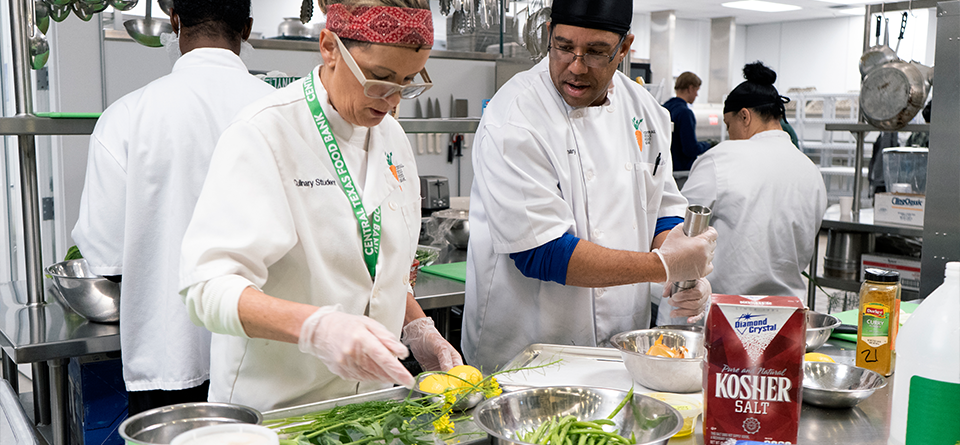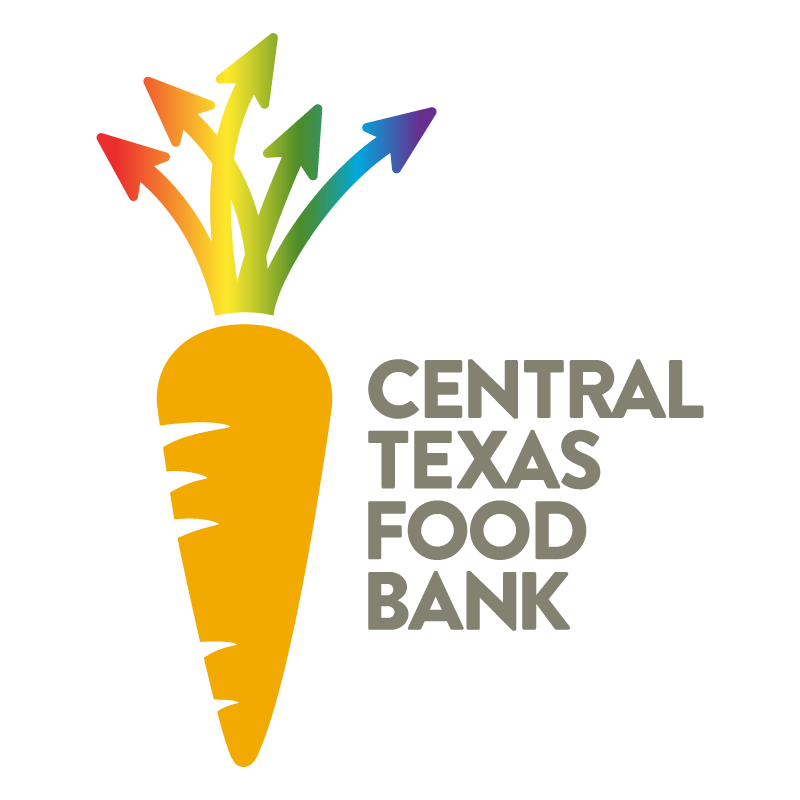Frequently Asked Questions
Q: What is the Culinary Training Program?
A: This hands-on job-training program is designed to teach basic culinary skills, cooking techniques, knife skills, equipment operation and professional development. Our program provides students with real-world experience in our state-of-the-art kitchen, preparing our students for a career in the food service industry upon graduation.
Q: How long is the program?
A: The Culinary Training Program is a 11-week program during which Students learn culinary skills such as knife skills, cooking techniques, food safety, nutrition and equipment operation in the Central Texas Food Bank’s state-of-the-art commercial kitchen. Students are also taught life skills such as financial literacy and interview tips.
Q: Is it a full-time or part-time program?
A: The program is full-time, five days a week, 30 hours per week. See the question below for specific days and hours.
Q: Where is the school located?
A: The kitchen is located at 6500 Metropolis Drive, Austin, TX 78744 (Note: NOT Montopolis).
Q: How much does the program cost?
A: The program is free and open to anyone in the community who meets eligibility requirements. The Culinary Training Program is supported by those who donate and support the Food Bank.
Q: What will I learn?
A: This program is designed to give students basic culinary skills such as equipment operation, knife skills and basic cooking techniques from an experiential learning perspective. It provides students with hands-on experience in a commercial kitchen working with commercial equipment, terms and food production as well as food safety and nutrition. The program is a mix of classroom time and hands-on job training. This includes the ServSafe Food Handler’s certification. Additionally, the program offers students personal and business financial basics, resume building and interviewing skills.
Q: Do I get paid?
A: This is not a paid job.
Q: Will I be hired after graduation?
A: This is an educational program only. Students will be encouraged to apply for employment with CTFB if open positions are available. However, all applications will go through the same process as an applicant who is not a student, and the best candidate will be chosen for any position open. There is NO promise or guarantee of employment. We will help students develop resumes, practice interviewing skills and network with employers to improve their ability to successfully gain employment. Employment in the community is the goal but NOT guaranteed. As part of the program, we provide case management support for up to six months after graduation.
Q: What are the hours?
A: The schedule is mostly Monday - Friday, 8:30 a.m. - 3:00 p.m. with a 30-minute lunch break each day. Some weekend and/ or evening events may be scheduled. Students are offered the opportunity to assist with events if possible, assuming it is deemed beneficial to the student’s growth.
Q: Do I need to have a car?
A: Students are not required to have a car but are expected to secure transportation to and from the training program. For those using public transportation, limited bus passes may be available to assist, but are not guaranteed. Transportation will be provided for field trips and events that are part of the program. 10. Do I have to buy my own uniforms?
Students will be provided with a Central Texas Food Bank student chef jacket worn daily in the kitchen and left to be washed daily. They are given two pairs of chef pants, one pair of safety shoes, a name tag and a knife set that is theirs to keep.
Q: How old do you have to be to be a student?
A: Applicants must be at least 18 years old by the day class begins. Students who are not yet 18 years of age must be enrolled in an approved high school program that allows them to take part in this program.
Q: Do I have to have a High School Diploma?
A: Students must have either a high school diploma or GED or be enrolled in an approved high school program that allows participation in this program. If the student does not have a diploma or GED and is interested in completing a GED, we can direct the student to resources to complete this. The goal is that upon completion of the Culinary Training Program, the student is employable. Completing a GED will help the student be more employable as most companies require a minimum of a GED. This can be done concurrently with the Culinary Training Program.
Q: What kind of person are you looking for as a student?
A: We are looking for people who are interested in food service careers, people who are ready and willing to learn and work hard, have a passion for food and have a heart for the mission of the Food Bank.
Q: Do I have to take a drug and alcohol test?
A: If it is suspected that a student is under the influence of a substance, they may be asked to undergo a drug test or breathalyzer test. If it is determined that the student has come to class under the influence of alcohol or drugs they will be dismissed from the program. This is a “No Tolerance” safety violation.
Q: What physical qualities do I need to possess?
A: Working in a kitchen is a very physical job. If you have medical problems that prevent you from being able to stand for extended lengths of time, pick up heavy objects, bend down or restrict your sight or hearing in a way that would make it unsafe for you to work in a commercial kitchen we may consider this in the application process. Our goal is for students to be set up for success and be safe. We make reasonable accommodations for physical disabilities that would not risk a student’s safety, the safety of those working around the student or those being served by the student. The standard for our work environment is:
- Ability to walk, stand, sit, kneel, push, stoop, reach above the shoulder, grasp, pull, bend repeatedly, identify colors, hear with aid, see, write, count, read, speak, analyze, alphabetize, lift and carry under 50 lbs., perceive depth, operate a motor vehicle, and operate motor equipment.
- Conditions may include working inside, working around machines with moving parts and moving objects, working closely with others, working alone, working protracted or irregular hours, and traveling locally.
- Kitchen equipment (machines, tools, devices) used in performing only the essential functions include a six-burner stove, griddle, grill, fryer, steam-jacketed kettles of varying sizes, combi ovens, blast chillers, tilt skillets, meat slicer, bread slicer, stand mixers, dish machine and general smallware. Additional items may be added as the need arises. Office equipment includes computer and related equipment, calculator, copier, fax machine, telephone and automobile.
Q: What if I have learning disabilities such as dyslexia or don’t speak English well?
A: Students must be able to communicate in the kitchen. Language barriers are discussed on a case-by-case basis to determine how much of a gap there is and how it may affect the student’s learning. The goal is to set students up for success. Students should be able to read, write and speak English well enough to read recipes and lessons, fill out reports and quizzes, etc.
Q: What if I have a criminal record?
A: Past criminal convictions, both felonies and misdemeanors, are looked at on a case-by-case basis. However, if you are a registered sex offender, you MAY NOT become a student due to activities and/or work locations from which sex offenders are restricted. For more specific details, information and requirements please read the CTFB Student Agreement.



